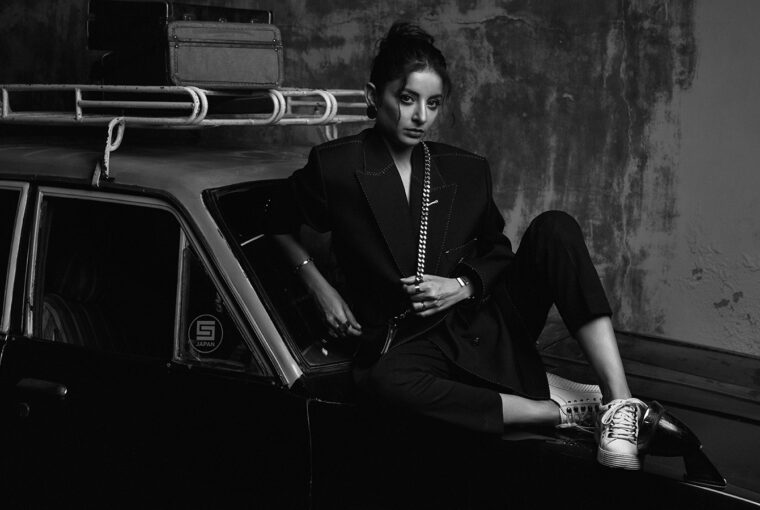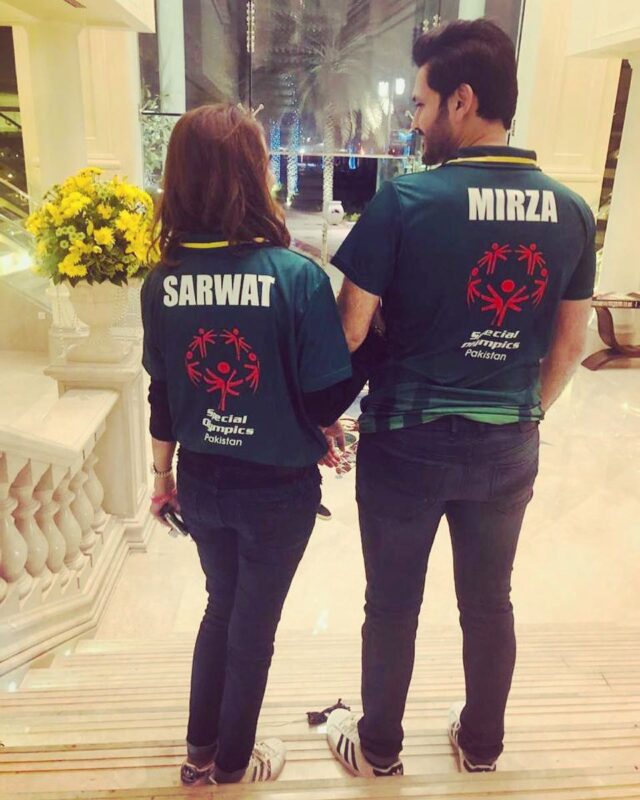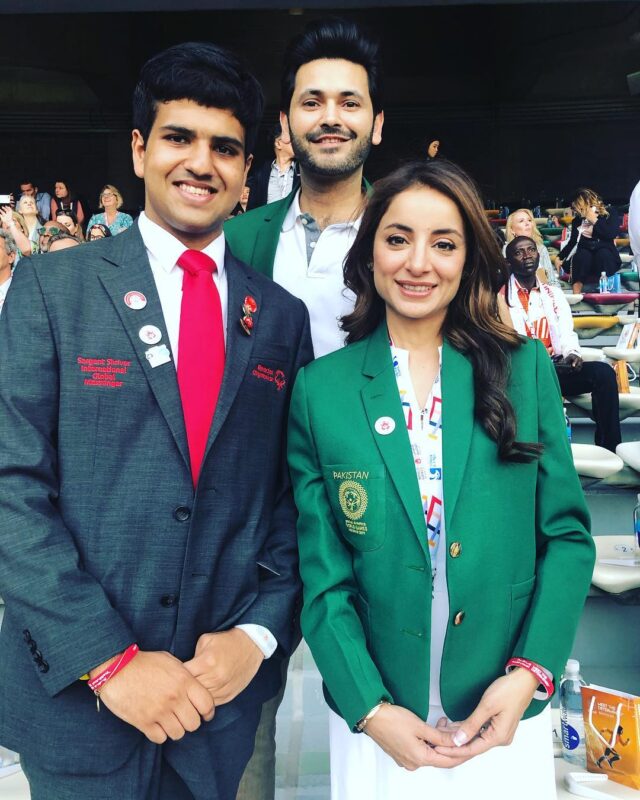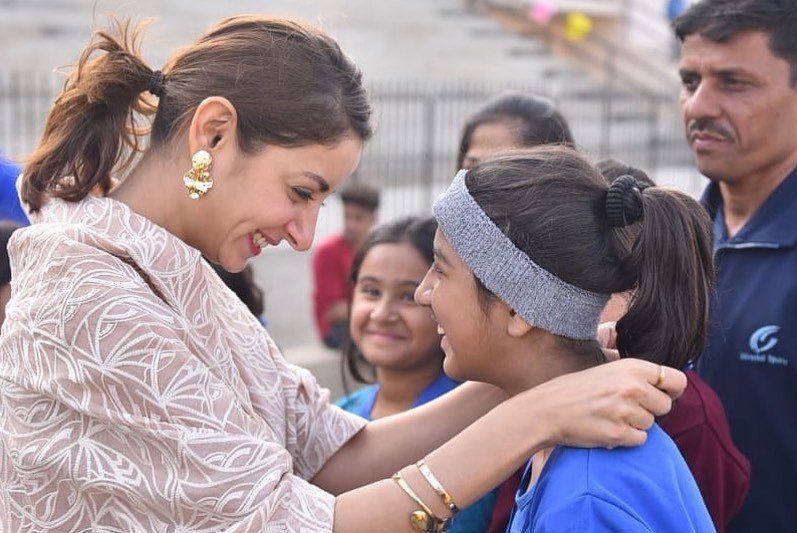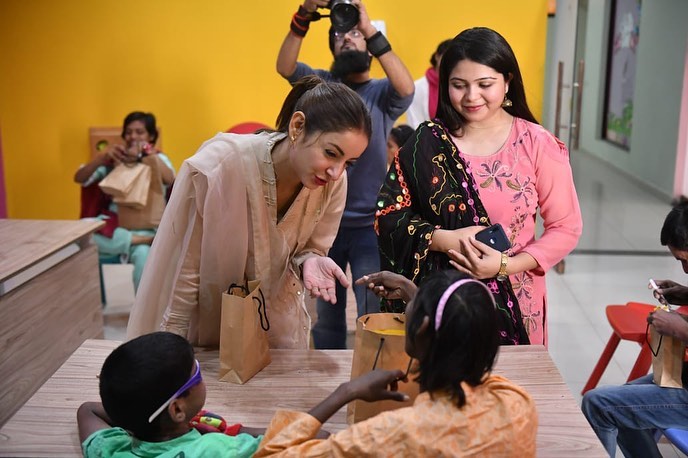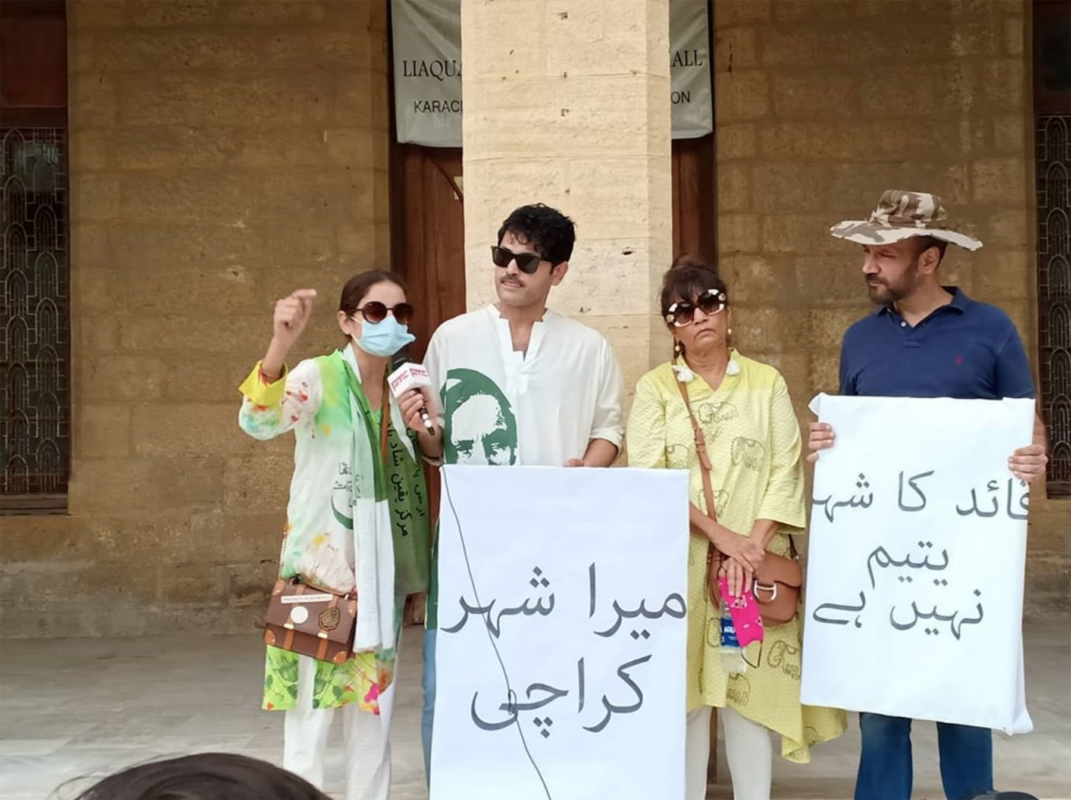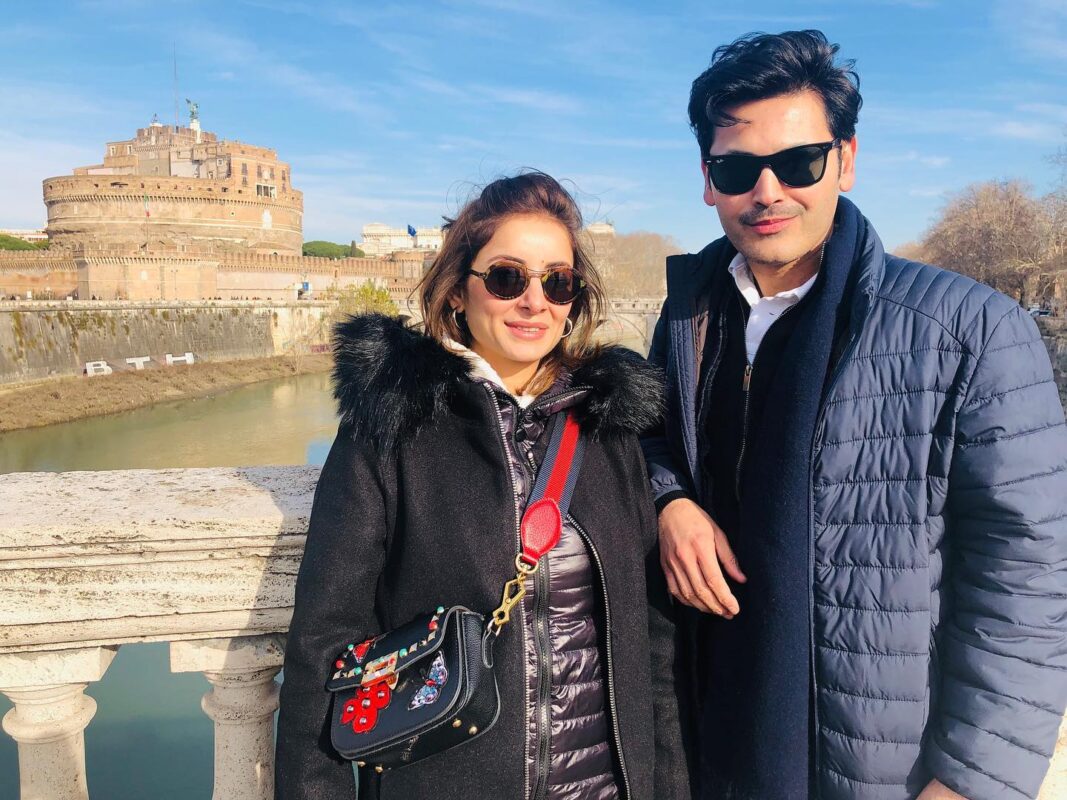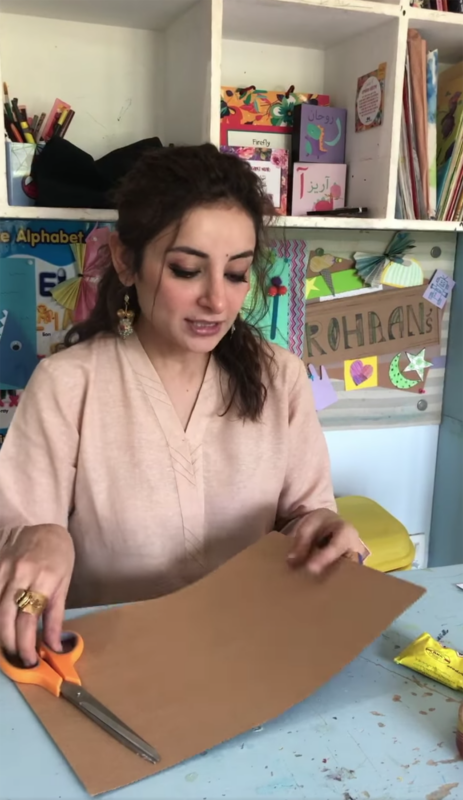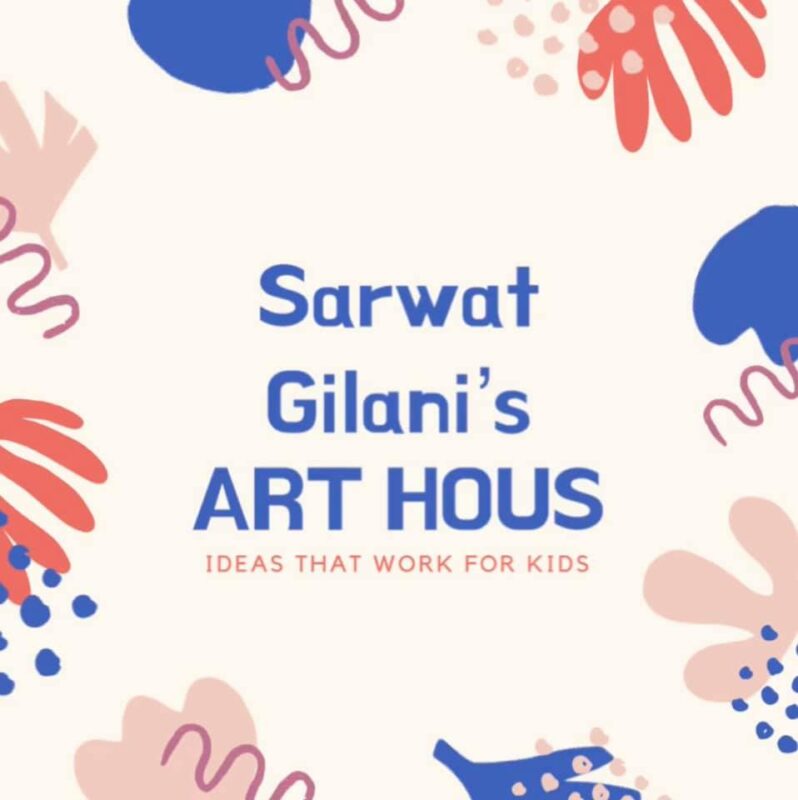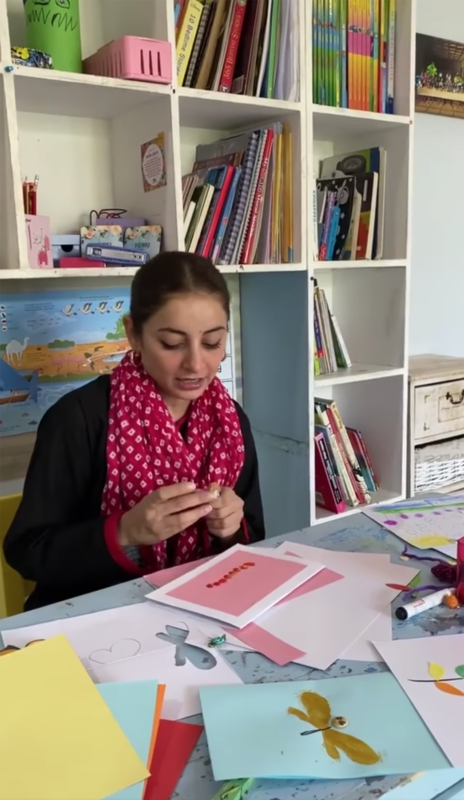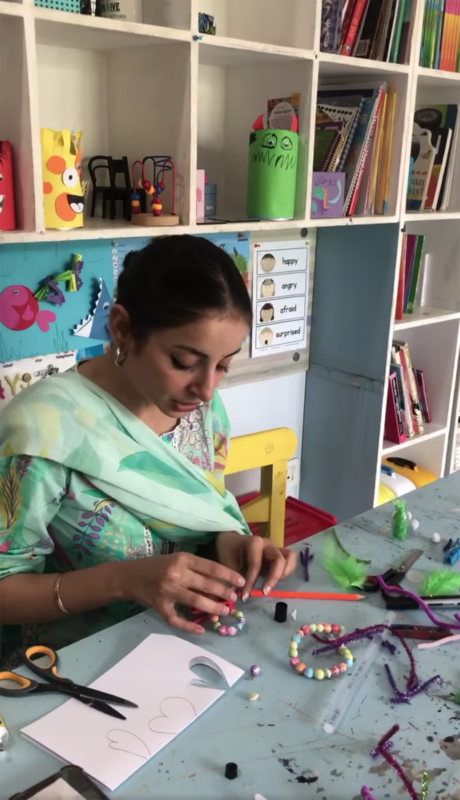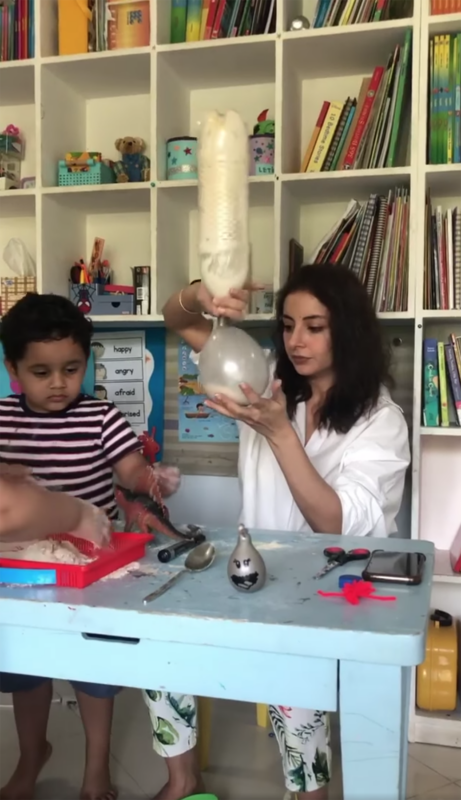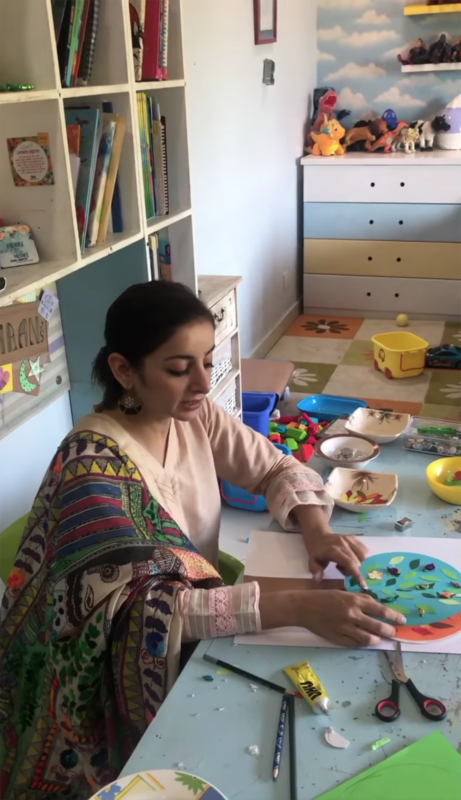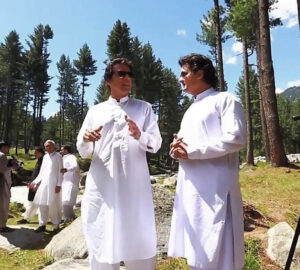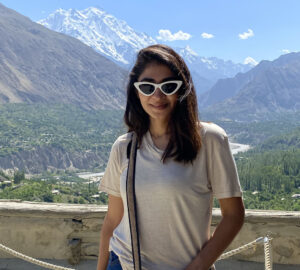It’s Sarwat Gilani’s time to shine. Following the success of her latest project, the groundbreaking web series Churails, Gilani has been thrust firmly in the spotlight, wowing critics both at home and abroad with her fiery performance. The industry’s new ‘it girl’, however, is not one to just sit back and enjoy the laurels; she’s been busy using her star power to highlight social causes, stand up for women’s rights, and provide her 1.7 million followers on Instagram a ray of hope during the Covid-19 enforced lockdowns with her live arts and crafts sessions. Leading journalist and media producer Fifi Haroon meets the actor-turned-activist and quintessential Karachi-ite to talk all things film, feminism, family and freedom.
Sarwat Gilani is no longer biding her time.
This, she believes, is her moment despite being the “tortoise who has been plodding along in the industry for the last 18 years.” This actor, activist and artist, the quintessential Karachi girl who is seen holding angry placards at civic protests and holding her wimp of a screen husband (played by Vasay Chaudhry) to the nose of her rifle in both halves of the money-spinning Jawani Phir Nahin Aani film series is currently the new “it girl” with the runaway success of Churails, the Zee5 TV series from Pakistan which is wowing critics both sides of the border.
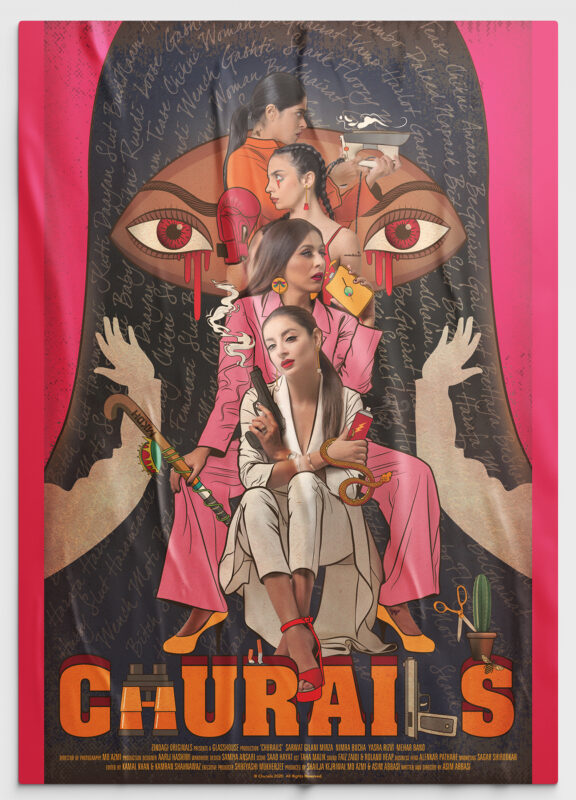
I have interviewed Gilani before for the BBC. She seemed shyer then, more hesitant in tone, still struggling to be counted amongst the more commercially successful Mahiras, Mehwishes and Mawras. There was her fiery representation of a Pakistani Hindu activist in Seeta Bagri (2016), the Hum Award nomination for the best female in a negative role for Dil-e-Muztar (2013), but somehow the spotlight has skirted around her a bit. She was never firmly the sugar in the plum.
Despite losing the lead role in Cake (2018) when she became pregnant, Sarwat Gilani has become a believer in second chances. Playing the lawyer turned socialite turned churail Sara Khan, part of the gang of four in her first international TV series for the acclaimed Cake director Asim Abbasi, seems to have emboldened her. She is surer in statement, clearly not suffering any fools and openly critical of the local government’s inefficiency in running her city, Karachi. Gilani’s Instagram account with a 1.7 million following now proclaims her as “Churail Sarwat.” But for the last four months of quarantine she has been sweetly regaling her social media audience of mums with arts and crafts lessons with her two sons Rohan and Araiz from her second marriage to actor and cosmetic surgeon Fahad Mirza. Her tumultuous first marriage to model Omer Saleem is one she would probably like to put behind her.
Will Churails open up further possibilities for this new feminist icon in the times of Corona? It is October, and Gilani is already busy in rehearsal for a Sarmad Khoosat web series focusing on Indian writer-director Gulzar’s musings. But unlike most in her fraternity she answers my whatsapp messages promptly and without need for a manager.
As for what else is on her cell phone…
One of Churails’ most iconic scenes is the revelation of the 34 dirty messages that your character Sara Khan’s husband sends to women. Has any man ever sent you dirty messages on your cell?
I have got death threats definitely! But that’s nothing to be scared of because there is only so much that you can do and the rest you leave to God. I think I have probably one dirty message on my phone right now, but I don’t really check messages from people I don’t recognise so if there are any they will be buried deep in my unread messages. There are like over a thousand unread ones on my mobile!
“People in Pakistan need to see Churails because it is the ugly truth”
Recently, Churails was banned, then reinstated on Zee5 for Pakistani viewers. How did you feel when it was banned and why do you think it is important for Pakistanis to see Churails?
I felt like somebody was putting a pillow on my face and suffocating me. As a creative person, as a human being and as a woman.
So you took it very, very personally.
Absolutely, when you work so hard on something that is so honest then you do take it as a personal attack. We only talk “takalufan” on our media platforms when it comes to most real issues in Pakistan. When Churails was taken off air it felt we were almost back in the Zia-ul-Haq days when they banned anything and everything. And I thought next they will tell us we should wake up with dupattas on our heads regardless of the role. It felt like somebody is taking all my power away. The freedom to be creative and to have a voice. And it wasn’t just with Churails. The same treatment was given to Sarmad Khoosat’s amazing piece of art or even the Gala biscuit commercial. Why are we entering the dark ages again when we have worked so hard to bring some awareness into content? Are we going to have to go to war all over again?
“Churails chose to make people uncomfortable by showing what society wants to ignore”
People in Pakistan need to see Churails because it is the ugly truth. We as a nation have become very complacent. We have become very lazy. We want to mind our own business and we don’t want to go through the hassle of fixing other people’s problems. Whether that is a community’s difficulties or a moral issue. We can’t deal with a true representation of our society – we don’t want to acknowledge the woman with a foul mouth, who is drinking a little, smoking or cursing.
Churails isn’t presenting an alien nation that could have lived in Pakistan. We are just showing you an image of a society that is already there through fictional characters. Be it extramarital affairs, misogyny or the patriarchal mindset or beating your children or the violence in Pakistani society – all of that is very real but our entertainment industry chooses not to show it. So Churails chose to make people uncomfortable by showing what society wants to ignore.
“It is my responsibility as an actor, as somebody who has so many eyes and ears following me, to be an example. There had been protests about how badly DHA maintains our streets after a storm but there was nothing in the news. And I realised of course, the media will only come in for coverage when they know celebrities will be there. So I decided my face needs to be out there”
Recently, you were seen raising your voice against the after-effects of the monsoon storms on urban life in Karachi. You also participated in the protests against the highway rape incident. What motivates you to be there to take a stand in line with others as a citizen and as a celebrity?
We are only taught to look out for ourselves. If the lights keep going we look to buy a bigger generator, if there’s water stagnating on the streets we buy a bigger four-wheel drive. But as a society, we do nothing. We need to feel a common sense of responsibility and take action.
It is my responsibility as an actor, as somebody who has so many eyes and ears following me, to be an example. There had been protests about how badly DHA maintains our streets after a storm but there was nothing in the news. And I realised of course, the media will only come in for coverage when they know celebrities will be there. So I decided my face needs to be out there for this cause. I have long been a patron for the Special Olympics and I’m involved in polio drives but even this matter needed a face, or someone who was ready to get out there and stick their neck out. When I saw those videos of cars being washed away and people in distress how could I walk away? And I knew some of these people. There was a young child who died. Then a couple where the wife was on a wheelchair, and she couldn’t get out. It really shook me up. And it shook me in a way where I did not care about myself, or my security or my sanity. I was so angry at everyone, with the system, with the lack of caring. I met so many nice people who would whine and crib behind closed doors but do nothing. When it comes to standing up and fighting for a cause I can count the doers on my fingers. So I thought fine, I will do it.
Have you always been this way, or has working in Churails motivated you further to stand up for what you believe in?
I have always stood up for women. Even back in my college days when I would take public transport during the day to save money for art materials – If there was a woman sitting next to me crying, I would ask her why. And she would say the guy behind pinched me. Even then as a 19 year-old nobody, I would make a big fuss and stand up for her, knowing that someone could retaliate. When I see a problem I have to find a solution, regardless of what consequences I might face. That is just who I am.
I remember I was driving my car on Zamzama late one night and I saw this woman standing alone, she must have been about nine months pregnant. And I stopped my car up and I said “aap ko kidhar jaana hai? [Where do you want to go?]” She said she had to go to till the Saddar traffic signal. I was going somewhere else, but I took her there. Seven years later I was at Ziauddin hospital and this woman comes up and says do you remember me? She had a six, seven year old kid with her and said remember I was pregnant and you gave me a lift? She apparently started having labour pains right after that, and was taken straight to the hospital. She told me this kid is here because you gave me that lift. See, the difference we can make to someone’s life by a random act of kindness?
On a normal day if someone needed my help I would do it a thousand times. What Churails did for me is it showed me how to take on something on a larger scale, to stick my neck out for a larger cause, to join that struggle. I felt I could be naddar [fearless], I could be besharam [shameless]. I didn’t care any more what people thought of me. I decided I would be a responsible citizen who owns up to her city’s problems.
And yet that video of you going to the highway incident protest with Frieha Altaf took away some of the shine from your image of a responsible citizen who protests wrongs. How have you dealt with that?
You know Fifi, people misunderstand celebrities all the time. Frieha and I were talking about the fact that kaam dhanda, rozi aur bachay chor kay we have become professional protestors – that instead of doing our jobs we had made this our first priority. She had the Lux Awards coming up, I had work but we would put all that aside and we would go to the protests. This video is from about the fifth one we were going to. It is hurtful, sure, when people respond without knowing the story but that is okay. So be it. We know we were going for the right cause and we were doing the right thing.
TV dramas pit women against each other constantly. Yet Churails emphasizes a community of women who support each other despite class and background. Do you feel that is something that can work in modern Pakistan?
It already is happening! Go to any organization in Pakistan and you will see all kinds of people working together. I think this is a very clichéd mentality when somebody thinks only elite women can communicate with each other. When I was studying at Indus Valley, we had students from villages in Balochistan, from Quetta from Peshawar. We would understand each other, we were all on the same page. So these are just excuses. We live with these preconceived notions that need to be shed.
I remember you telling me that you were originally supposed to do the lead role in Asim Abbasi’s Cake, which went on to international acclaim and represented Pakistan at the Oscars. But you became pregnant and that was that. And now you’re in Abbasi’s Churails which again is getting rave reviews across the board. Has this made up for the loss of Cake?
I remember during the Jawani Phir Nahi Aani days we were sitting in the trailer and talking, and I said to Vasay (Chaudhry) that I am so done with commercial cinema. At that time Piku had just come out and I said when is that sort of cinema going to come to Pakistan? And he said we have just started; it’s going to take years. So when Cake came to me about four years after JPNA I was just over the moon. It was very heart-wrenching when I had to give it away because we were already rehearsing when I became pregnant. And then I had to find a surrogate mother to do my role in the film. I felt the only person who could do justice to Zarine in my stead was Aamina (Sheikh) so I told her you have to read this. Obviously my heart was broken when I had to give it up. When I was watching it in the cinema I knew every line in the script. I had literally manufactured Zarine in my head. For years I just asked God for one thing, that somehow one day Asim Abbasi calls me to offer me another role. So when Asim called from me from London to say he wanted me to read Churails I was blown away. I was jumping up and down like a fifteen-year-old girl. When it finally premiered I said to Asim you have mended my heart, today is the day that I am letting go of Cake. I think everything happens for a reason and it’s only in hindsight that you realise God had a better plan for you.
Many of our female actors have had their “moment”, their time in the sun. Aamina Sheikh and Sanam Saeed had Cake, Mehwish Hyatt had Punjab Nahin Jaungi, Saba Qamar had Hindi Medium and Baaghi. Do you feel that this is Sarwat Gilani’s time?
I am the kachwa [tortoise] who has been plodding along. I never wanted to be that actor playing Sheila on one channel, Sara on another and Sakina on a third. In the last 18 years I had cried too much for television and it was time to make someone else cry. So yes this is my time and it’s a great gift from God after 18 years of no recognition from my own fraternity. Even now, after Churails I am still the outsider because Churails is so alternative, but I am okay with that. I know how people get their awards here.
“There is no ownership of this city; Karachi is just used and abused by everyone”
You are a quintessential Karachi girl, growing up here, studying at Indus Valley. What is it about the city that you think made you fall in love it and what is it that makes you stay in love…
I am no longer in love with Karachi. I was in love with the idea of Karachi, of what it used to be when we were growing up – safe, secure, friendly, non-judgmental. But now that I have grown up I realise maybe things were happening all along and we just didn’t know about it. Today we have become very selfish. And now living in Defence I don’t know who my neighbours are. There is very little sense of community. There are those who are from elsewhere but they earn their livelihood from Karachi. “Main asal mae tau Punjab say houn. Kamata Karachi main houn magar Punjab main invest karoung ga” – that’s the mentality. There is no ownership of this city; Karachi is just used and abused by everyone. I’m grateful that I have my family and everything’s fine, that is a blessing. But there is no real sense of pride. Because whatever one does, even when one goes on raising ones voice every day there is that deep sinking feeling inside that nothing will change.
Recently you did these arts and crafts activities with your kids on social media during the pandemic. What motivated you to do that considering a lot of star mothers like to protect their kids from the limelight?
I would always shy away from commercials where they would want to use my kids. The answer was always no. But during the pandemic I did it because I felt everybody needed us. And I too needed to overcome my shyness.
“During the lock-down I would wake up in the morning and ask my husband what should I do today? There was no motivation and I felt so many parents must have felt the same. I found my motivation through starting the online sessions with my kids”
Sarwat Gilani is shy?
Actually I am incredibly camera shy. I hate it when people talk about me or how amazing I am. It makes me really uncomfortable. But I sensed that I needed to do this to help a millions mothers out there coping with the pandemic. Yes I have always put my kids on a pedestal but I felt these mothers and their kids should also be put on a pedestal and high on my priority list. So I opened the door to my home on social media, which I have never done in 18 years. I felt the times demanded it. During the lock-down I would wake up in the morning and ask my husband what should I do today? There was no motivation and I felt so many parents must have felt the same. I found my motivation through starting the online sessions with my kids. It was something to look forward to for me, for them, for those watching us. I did this for four months Fifi, and some days it was painful. But it made people happy because otherwise it was so depressing. You know, nothing was edited out. I wanted people to know that if a 3 year-old boy is saying something nasty to his brother how mums could deal with it.
Did the arts and craft classes you did with your kids take you back to your Indus Valley days, when you were studying art in Karachi?
It certainly got my creative juices flowing but I don’t think you will be seeing a Sarwat Gilani exhibition anytime soon! I feel there is a huge gap between the elite schools and the underprivileged schools on what they impart to children. And perhaps teaching kids across the board about the value of creativity was my little contribution to a level playing field. Kids really learn better through play. Some foundations saw it and have shown interest so let’s see – I want to take it further.
When you were pregnant you said that: “I will continue working after having a baby. The world doesn’t stop when you become a mother.” But now that your sons are growing up, has becoming a becoming a mother changed you in any way?
I would say that I have become super organized. I was always OCD but now I even have a menu list of my kids’ snacks!
Poor kids! So you’ve created two OCD kids while being that yourself?
(laughs) But they are so in the routine now that if they haven’t had their shower by 7 o’ clock they go nuts! So it works for me and it works for them. I would also say I’ve become more careful as a mother about security. I send a guard with the kids even if they are going for a play date. Karachi does that to you.
So in Churails your husband played by Umair Rana wants you to be the “perfect” woman – that word is used constantly. Being married to a plastic surgeon in real life, does it feel like the same sometimes?
Not at all. Fahad elevates me and understands my conflicts and struggles because he is in his mind also trying to face his own. And who wants to be perfect? Perfection is boring. Reality is far more interesting.
Why do you think the female characters in Churails work so well as feminist or female icons?
Because they are feminists in real life too and have gone through their share of ups and downs in life. Even while the four of us were rehearsing we would share our own life stories with each other and we realised that we are strong women in our own lives and that is why we can play these characters on the television screen. That why Churails flows so naturally.
You’ve just done a series with a male director, Asim Abbasi, whose first film also focused on women. Can men tell women’s stories as effectively as women?
I wouldn’t say that all men can, but Asim Abbasi certainly can. He has grown up with a lot of women in the family – his mother and three or four sisters. So his sensibility is totally different from a guy who has grown up with no strong female influence in his life. It really depends on what you’ve seen around you. So maybe Khali ur Rehman Qamar was exposed to some nasty women or experiences in his life for him to tell the stories that he does! But men who are open minded and who are sensitive are better storytellers when it comes to women. Sometimes even women can’t tell women’s stories as well as Asim Abbasi has done.
“The day you feel that you want to take all other women along with you and work to raise them to an equal level. When you see their problems as your problems is the day you become a churail”
Many journalists have asked you whether you mind being called a Churail and you said you now love it. So for those of us still in training, what does it take to be a churail? This is your Churails master class moment.
The day you feel that you want to take all other women along with you and work to raise them to an equal level. When you see their problems as your problems is the day you become a churail.
ICONIC KARACHI
SARWAT IN HER CITY
Instagram: Sarwat Gillani
Photography:
Shahbaz Shazi
Styling & Creative Direction:
Tabesh Khoja
Hair & Make-up:
Nabila Salon
Designers:
Hussain Rehar
Sania Maskatiya
Sana Safinaz
& Emraan Rajput
Jewellery:
Allure by MHT
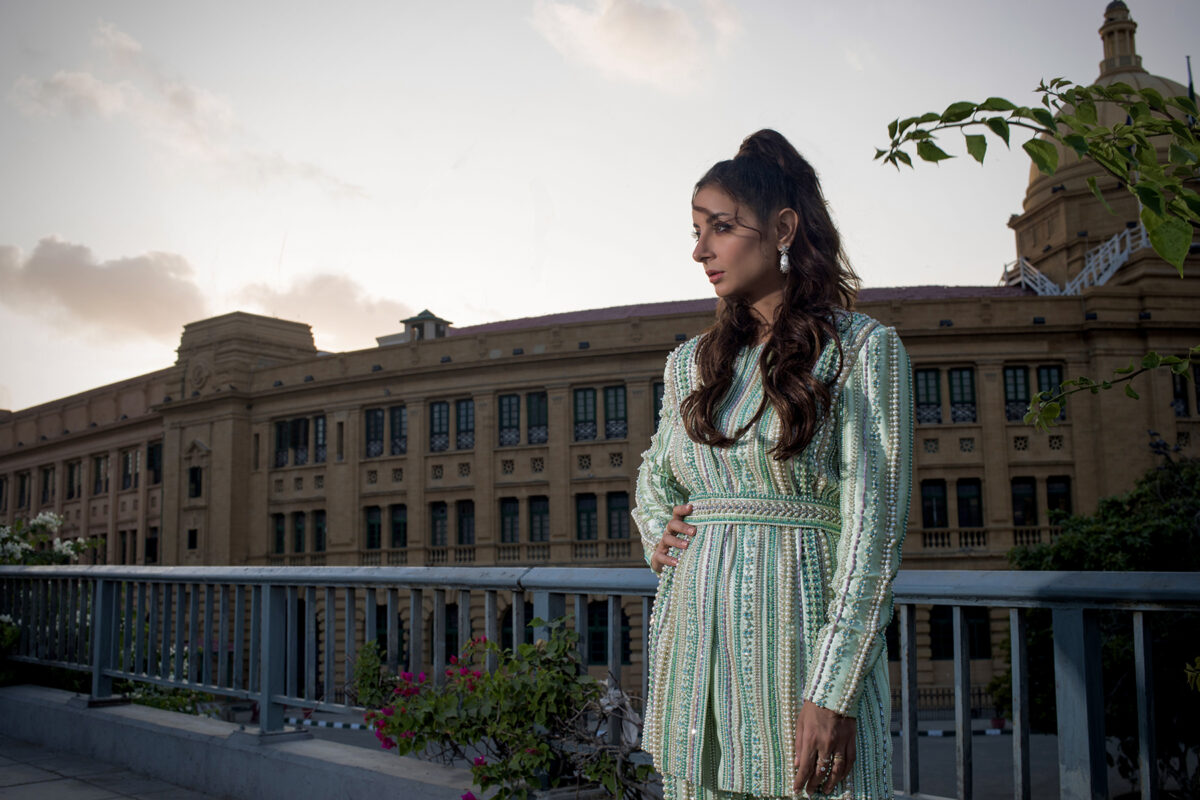
Outfit: Hussain Rehar
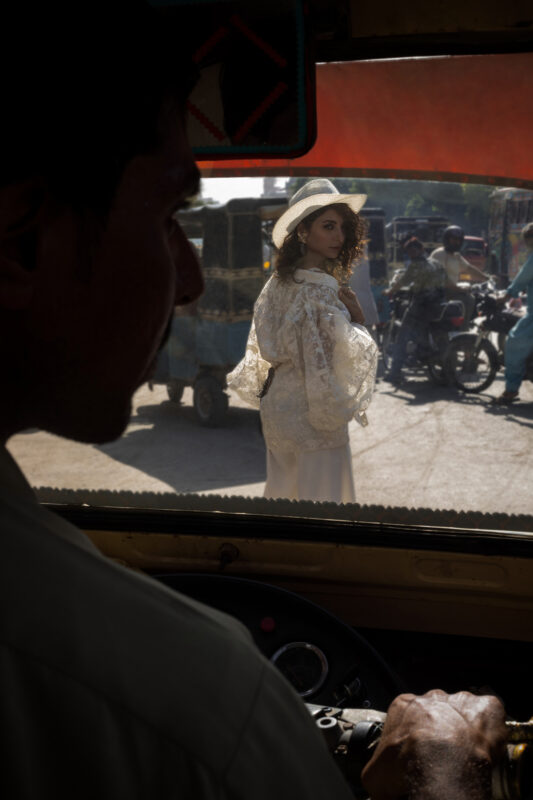
Outfit: Sania Maskatiya 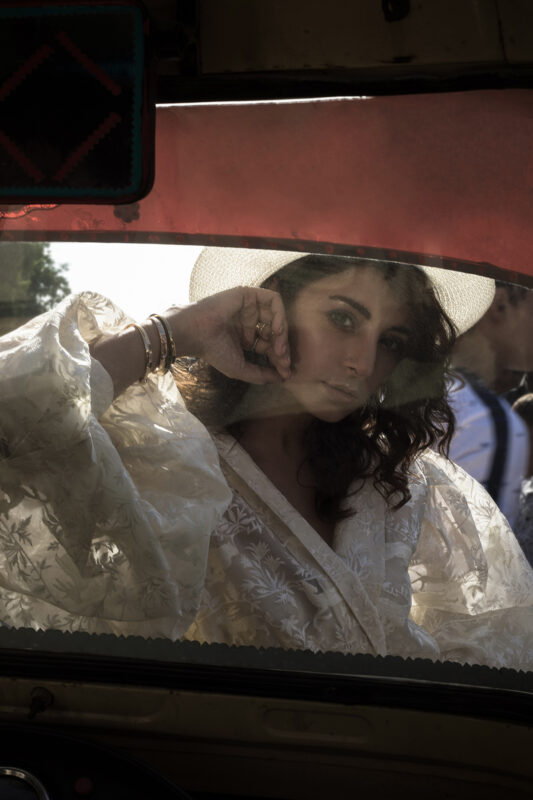
Outfit: Sania Maskatiya
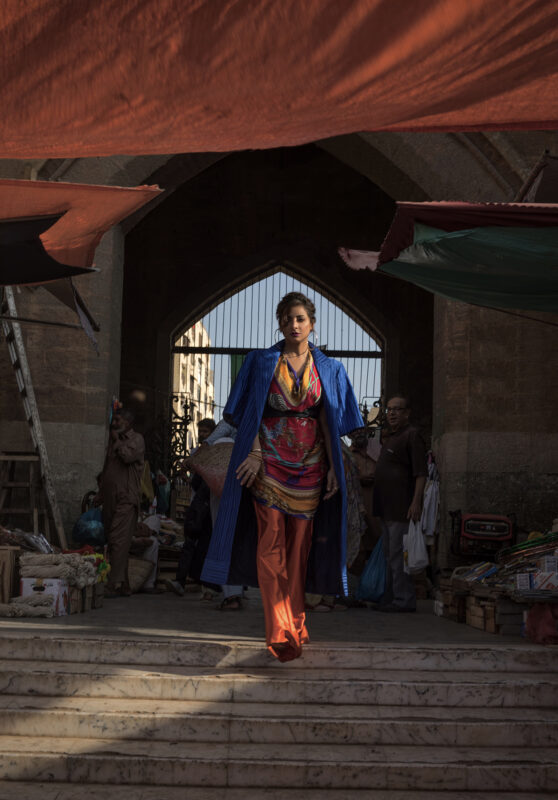
Outfit: Sana Safinaz 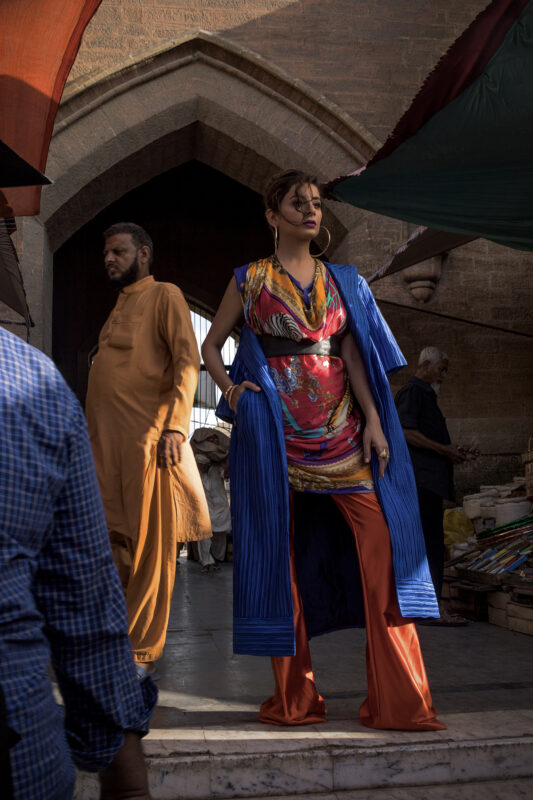
Outfit: Sana Safinaz
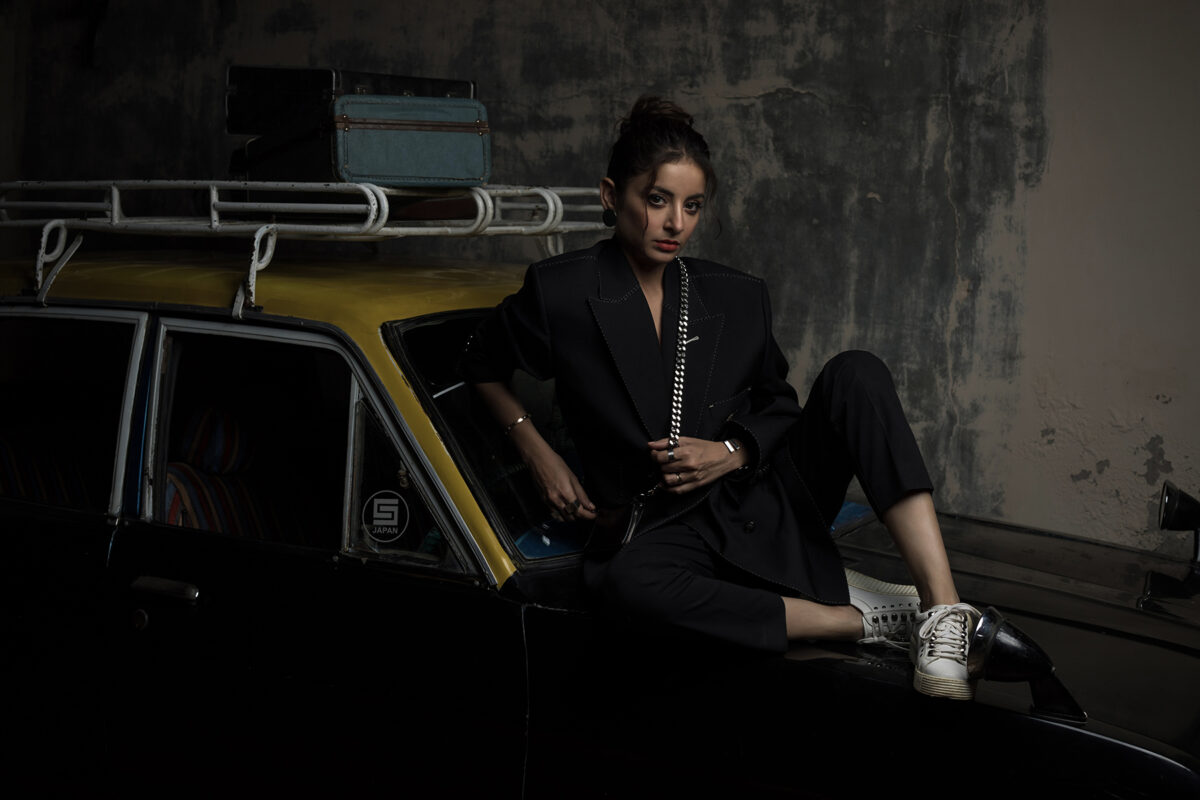
Outfit: Emraan Rajput


